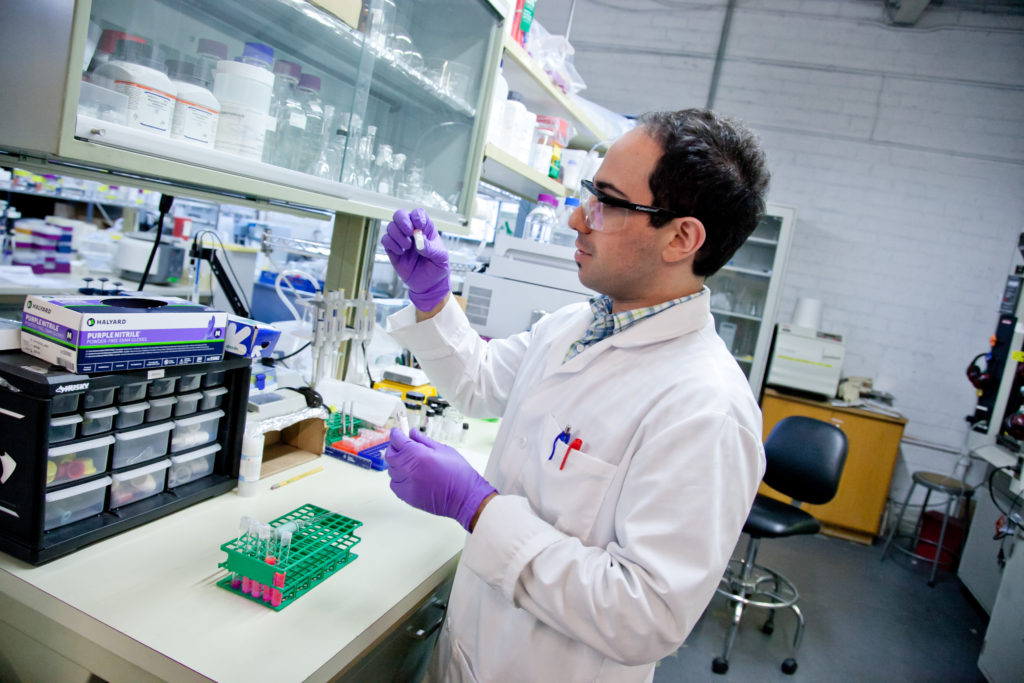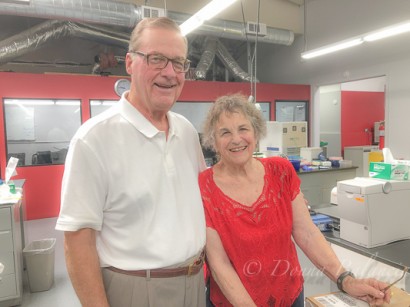The long road to building Pasadena into a biotech hub started with an academics predisposition and a brick building on Foothill Boulevard

Healthcare and biotech companies are taking hold in Pasadena as the city doubles down on its educational and workforce assets to boost economic development.
With Caltech and Pasadena City College, there are local science resources and the City of Pasadena and County of Los Angeles want to develop economic growth. But history shows most innovation starts off small, and with nurturing and investment, can yield tremendous results.
The Pasadena Bio Collaborative Incubator has been an essential component of Pasadena’s growth as it pursues the goal of becoming a science hub. It’s a valuable resource to provide assistance to science-based companies and to help bring jobs and STEM opportunities to the community.
Pasadena Bio Collaborative has a three-pronged mission: It provides space for startup science companies, it assists those companies to develop their business plans, and it provides area students an opportunity to develop the practical skills needed by industry.

The incubator has been rewarded for its efforts. It has grown from 500 feet in 2004 to 12,700 square feet today, and 69 companies have flourished behind its doors. Twenty of the companies left to because they grew too big, others have been acquired, and others have received funding to grow and stay in the city.
Ultimately the City and the board members of Pasadena Bio are the stakeholders, but they’ve put their faith in the management of Bud Bishop. Before Bishop the incubator was led by co-founder and CEO Bruce Blomstrom.
The science personnel development is led by Dr. Wendie Johnston, an early founder of the Pasadena City College program.
“There are three people who have been important to the growth of Pasadena Bio: Bruce Blomstrom, Bud Bishop and Dr. Wendie Johnston,” said Eric Duyshart, Economic Development Manager for the City of Pasadena.
Blomstrom helped the non-profit to grow and he secured a motivated board of directors, Duyshart said. He retired in 2016.
“We thought we’d never find someone like him again, and then we found Bud Bishop who wanted to give back to the community,” Duyshart said.
Laying the Groundwork as Biotech Hub Springs Out of Academia
Mike Giardello, president of Innovate Pasadena, said there are many examples where biotech, life science and healthcare hubs have grown out of academic institutions.
“You have these seeds that grow over time,” Giardello said. “Caltech has continued to spin off biotech companies. Early on you have the seeds, then clusters and then venture funds come, so you get a web that enables companies to start up here, stay here and grow here.”
While Blomstrom accomplished a great deal in setting everything up at Pasadena Bio, he retired and Bishop took over as president. Bishop oversees the organization day-to-day. Johnston is on the science side of things and has helped bring together opportunities with academic institutions, mainly Pasadena City College, where she was a science professor, but others as well.
“These companies have a need for talent and Wendie’s been helping match-make for the whole time the bioscience collaborative has been in place,” Duyshart said.
Ramping up Pasadena to become the next biotech hub has been a process, but has long been anticipated.
“It’s always been a work in progress,” Duyshart said. “It’s been a trend Pasadena had to pay attention to, given our local assets. It isn’t as immediate a business story as Internet startups. The bioscience collaboration has been a great resource for these startups.”
Duyshart said one reason the City got involved is there is a natural opportunity.
“We didn’t want the opportunity to pass us by,” he said. “We have to provide some opportunity for these startup companies to grow. If you give them relatively inexpensive space to do it in it’s better than having a long-term lease commitment and them having to buy all this equipment themselves.”
“Over time the number of donated items has increased,” he said. “Between Bruce and Wendie and Bud there is a great range of resources provided to the bioscience collaborative workspace. That’s been a nice way for these companies to pay rent on shared devices and not have to buy them outright.”
The expansion has been impressive.
Pasadena Bio counts among current resident companies Terray Therapeutics, which has developed a screening platform for drug discovery and Platinum Technology, which is working on an electrode-like product for deep brain stimulation.
“We want to keep companies in Pasadena,” Bishop said. “Over the last few years there has been tremendous growth, it was an intentional ramp up driven by Los Angeles County Supervisors. They’ve put together a good broad program. We were the first incubator in Los Angeles. Now there are soon to be 10. Everybody has a niche. Our niche is the early startup.”
Companies Get Assistance from Students and also Investors
Among the other companies at Pasadena Bio, one is working on a therapy that kills solid tumors, one is working on a vaccine, but there are companies working on consumer applications as well, including a 3-D printing company and one that uses light technology to remove tattoos.
Some of the people who pay their $1600 a month per bench have been there for several years, some stay until their product is financed or they outgrow the space.
Pasadena Bio has a space that has a reputation among scientists near and far, scientists from as far away as Europe have come to rent space. That’s because there are special contaminant-secure spaces as well as office space available for reasonable rates.
“One of the things we did before anyone was create an incubator that has Bio Safety Level 2 rooms so you can do this kind of work,” Bishop said. “So by correctly anticipating what might be more popular, we created an attractive place to land.”
And the companies that can often be comprised of two or fewer people often need interns and that’s where Johnston’s affiliation with the colleges comes into play. Students gain practical experience working with startups and it helps them, in turn, procure a science job because they have the skills industry requires.
“Our companies are gracious in the time they give to the interns,” Johnston said. “We’re proactive in creating a workforce here. And my job is to create an entry level workforce with ‘middle skills.’”
Johnston said many colleges require students to have an internship in order to get their degree. She said that companies want students with lab experience.
“The students will get some knowledge in the classroom, but they will get ‘acculturated’ when they have time in the lab,” she said.
Johnston said her work is too rewarding to give up even though she is of retirement age.
“Retirement isn’t all it’s cracked up to be,” she said.
Giardello said Pasadena’s continual track record of success is what brings the science and the investors.
“It’s a team effort but you’ve always had the technology that’s been here,” Giardello said. “Biotech may serve medical tech companies, medical tech companies partner with biotech companies, you have life science companies, you have every flavor and eventually you create a really healthy ecosystem.”
As the demands on healthcare, life sciences and biotech continue to grow, so will Pasadena’s interest and commitment, Duyshart said.
“The years of diligent work by everyone are finally paying off.”
By DONNA BALANCIA – Pasadena Now
Published : Tuesday, July 30, 2019 | 5:02 AM
